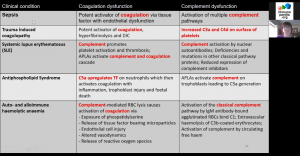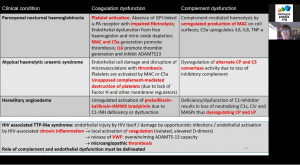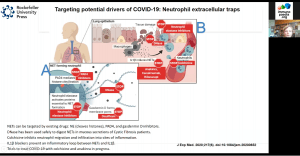This week we highlight SAIS/Immunopaedia COVID-19 Webinar featuring talks by haematopathologists Dr Susan Louw and A/Prof Jessica Olpie on immunothrombosis & COVID-19. Immunothrombosis is the direct interaction of activated leukocytes with platelets and coagulation function, this interaction usually involves dysregulation of neutrophil extracellular trap formation.
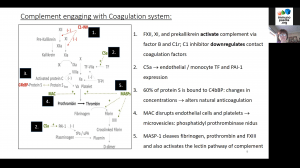 Dr Susan Louw began her talk titled “Immunothrombosis: lessons from other conditions” with a brief background on Thrombosis and how physiological process if left unchecked can lead to pathology. She discussed how cross-talk between the immune system (macrophages, complement proteins, neutrophils) and coagulation cascade (platelets and tissue factors) can cause to immunothrombosis.
Dr Susan Louw began her talk titled “Immunothrombosis: lessons from other conditions” with a brief background on Thrombosis and how physiological process if left unchecked can lead to pathology. She discussed how cross-talk between the immune system (macrophages, complement proteins, neutrophils) and coagulation cascade (platelets and tissue factors) can cause to immunothrombosis. 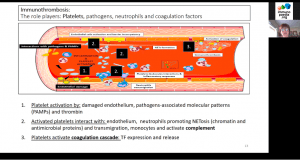 She then gave an in-depth yet brief overview of how coagulation proteins engage with the complement cascade (see image below) and the role of innate cells (macrophages and neutrophils) and cytokines in immunothrombosis. Further, she then highlighted that platelets, well known for their role in blood-clotting, have immunomodulatory properties. Dr Louw concluded her talk describing clinical conditions associated with immunothrombosis (see below).
She then gave an in-depth yet brief overview of how coagulation proteins engage with the complement cascade (see image below) and the role of innate cells (macrophages and neutrophils) and cytokines in immunothrombosis. Further, she then highlighted that platelets, well known for their role in blood-clotting, have immunomodulatory properties. Dr Louw concluded her talk describing clinical conditions associated with immunothrombosis (see below).
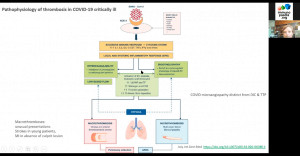 Jessica Opie’s talk focused on “Thrombosis in COVID-19”. A/Prof Opie gave an overview of homeostatic properties [coagulation factors (clot formation), coagulation inhibitors (clot controlling) and fibrinolysis (clot-dissolving)] associated with blood vessel injury. She then provided evidence which demonstrated that severe COVID-19 pathology is associated with dysregulation of tissue repair and blood vessel formation of the lung endothelial membrane. She also discussed how cytokine storm and dysregulation of the complement pathway contributes to excessive NETosis and is associated with severe COVID-19 pathologies (such as hypercoagulability, endotheliopathy, macrothromboisis and microthromobisis). She ended her talk describing how targeting either NETosis (using NET inhibitors) and the complement cascade could be potential therapies for severe COVID-19.
Jessica Opie’s talk focused on “Thrombosis in COVID-19”. A/Prof Opie gave an overview of homeostatic properties [coagulation factors (clot formation), coagulation inhibitors (clot controlling) and fibrinolysis (clot-dissolving)] associated with blood vessel injury. She then provided evidence which demonstrated that severe COVID-19 pathology is associated with dysregulation of tissue repair and blood vessel formation of the lung endothelial membrane. She also discussed how cytokine storm and dysregulation of the complement pathway contributes to excessive NETosis and is associated with severe COVID-19 pathologies (such as hypercoagulability, endotheliopathy, macrothromboisis and microthromobisis). She ended her talk describing how targeting either NETosis (using NET inhibitors) and the complement cascade could be potential therapies for severe COVID-19.
Summary by Cheleka Mpande






